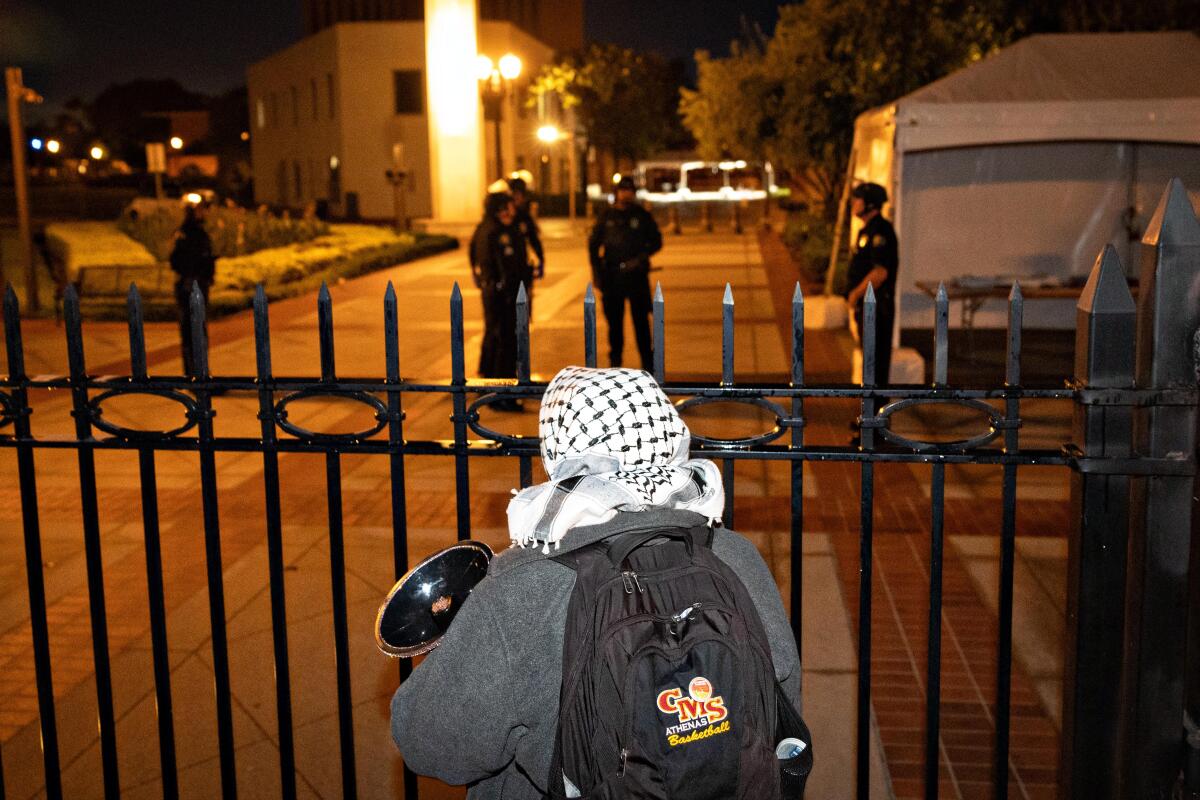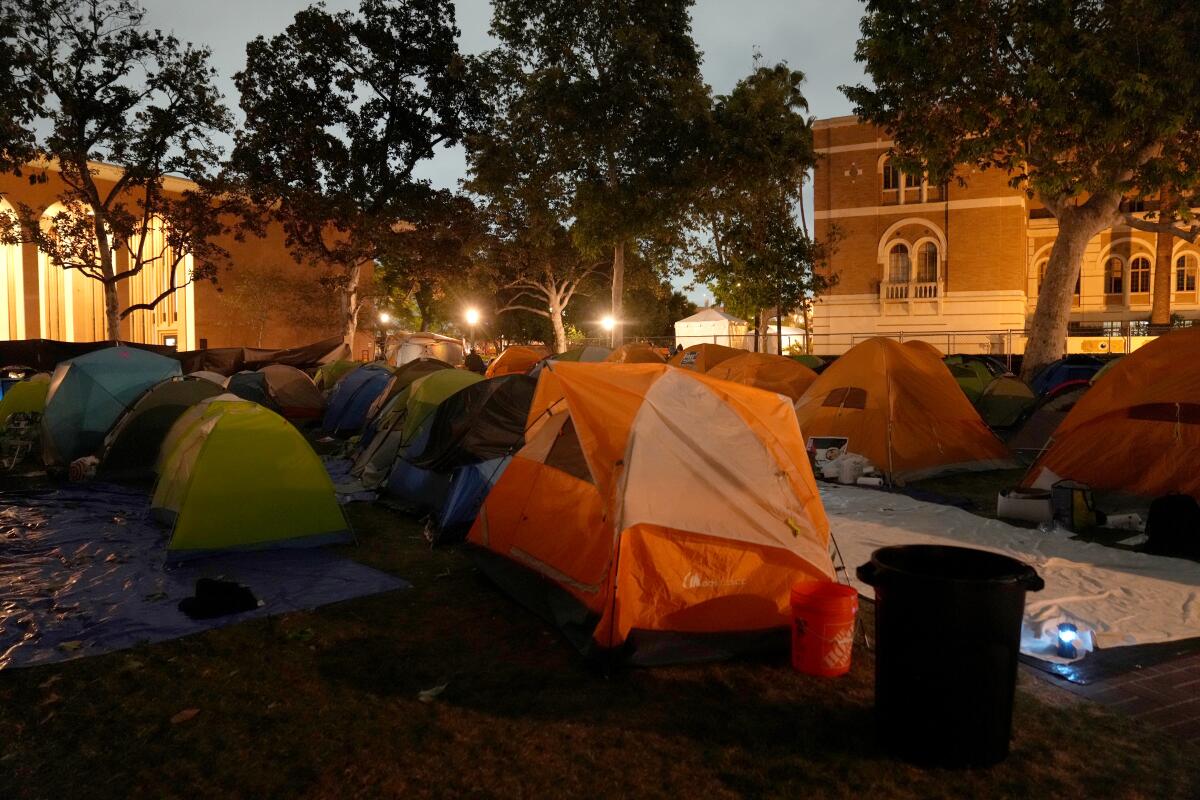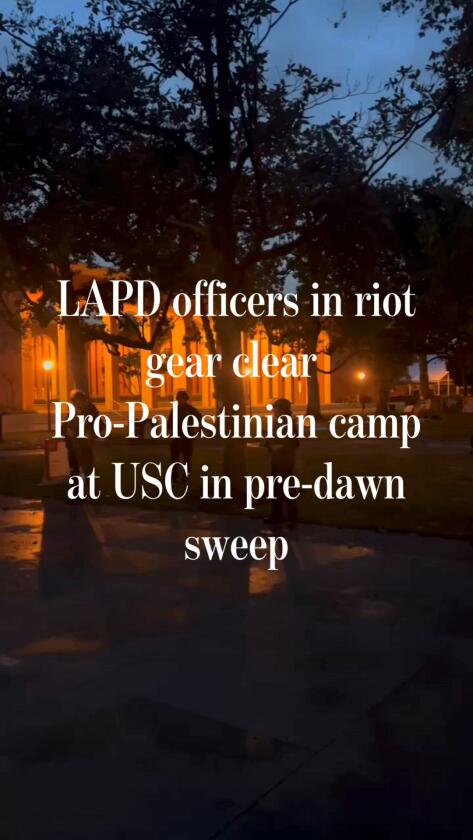Police remove tents, clear USC pro-Palestinian encampment; no arrests made

- Share via
In a swift predawn operation three days before graduation ceremonies begin, USC campus police and LAPD officers in riot gear cleared a pro-Palestinian encampment from the center of campus Sunday as protesters beat drums, chanted and later pledged to continue their demonstration.
There were no arrests during the sweep, according to USC officials and student activists. By about 8 a.m. some 40 tents, posters, debris and barricades had been hauled away. A party rental company moved in as a tall black fence was installed around the park.
“The operation was peaceful. Campus is opening, students are returning to prepare for finals, and commencement set-up is in full swing,” USC President Carol Folt wrote in a campuswide email Sunday.
Folt, who has been confronted by supporters and opponents of pro-Palestinian activists for her handling of the protest and free speech on campus, said the university had “issued repeated warnings.”
“When free speech protests devolve into illegal occupations, violating the rights of others, we must draw a line,” Folt said.

The police operation was the culmination of a second tense week of protests at USC and universities throughout the country as college presidents faced criticism for calling in police in riot gear to clear pro-Palestinian encampments. Leaders have struggled to balance campus safety and the right to protest, with calls to address antisemitism and anti-Muslim hatred. Many have been under pressure to clear camps before commencements, when parents, alumni, donors and luminaries descend on campuses.
In one of the most violent incidents at a protest, a mob attacked a UCLA pro-Palestinian encampment last week, prompting anger over the university’s handling of campus safety. Police arrested more than 200 people after moving onto the Westwood campus to push out protesters.
Sunday’s USC sweep was the second time police dismantled the encampment. It unfolded as graduation activities are set to kick off Wednesday with tens of thousands of guests on campus. Los Angeles police arrested 93 activists — most of them USC students — on April 24 on suspicion of trespassing when they cleared the encampment in Alumni Park.
At 4:17 a.m. Sunday, USC issued a text message alert saying the Los Angeles Police Department had arrived and that people should leave central campus, which was closed off to everyone, including students. Officers from the campus Department of Public Safety issued a dispersal warning to activists. About 30 protesters left as police pushed them toward the university’s Jefferson Boulevard exit.
“Free, free Palestine,” demonstrators chanted as they faced police at the perimeter officers set up outside the camp, beating drums while helicopters hovered overhead.
- Share via
LAPD officers cleared USC’s encampment at Alumni Park by 6 a.m. Sunday.
About 5 a.m., police entered the encampment. They dismantled tents, leaving behind posters, trash and makeshift barriers. Campus Police Chief Lauretta Hill gave a fist bump to the remaining officers. An hour later, Alumni Park was empty and quiet, largely devoid of police, as workers cleaned the grounds.
The University Park campus reopened to students, faculty and staff about 10 a.m. as USC issued a new warning via text message: Tents and related equipment were prohibited, along with camping and unpermitted events. Those breaking the rules would be subject to discipline.
“No individuals or groups may obstruct free passage throughout our campuses, commencement setup, or other functions,” the alert said.
“We will be back. Free Palestine,” said a message the student activists posted the Instagram account of USC Student Coalition Against Labor Exploitation. The pro-Palestinian group that set up the encampment, USC Divest from Death Coalition, uses the labor organization’s social media for its official announcements.
“We are not done,” a spokesperson for the student activists said after the camp was cleared. The spokesperson did not give details on future actions. The person declined to identify themselves because of fear of retaliation from the USC administration and students opposed to their activism.
Protesters — like others at universities nationwide — have demanded that USC boycott and divest from financial ties with Israel, which USC has rejected.
The encampment spokesperson said Sunday that “divestment is not a short-term movement. Divestment is a long-term movement.... The movement doesn’t end with this occupation. The occupation is simply one way to bring attention and bring our demands.”
After two meetings last week with protest leaders, USC President Folt posted on X that students “seemed more interested in having me issue a political statement in support of their viewpoint as opposed to coming up with practical solutions to resolve the situation.”
In those meetings, Folt said she had “no intention” of asking the LAPD to come to campus again. In an interview with The Times last week, she did not rule it out as an option but said it was not her preference.
In her campus letter Sunday, Folt wrote that “despite our efforts to de-escalate, the occupation was spiraling in a dangerous direction over the last several days.... With no resolution in sight, I requested the LAPD to assist DPS in removing the encampment as peacefully and safely as possible.”
Devin Griffiths, an associate professor of English and comparative literature, said it was “disappointing that the LAPD was invited back onto campus after many faculty strongly expressed their anger and worry at the invitation of the LAPD a little over a week ago.”
Griffiths joined a faculty march last week in support of students’ rights to protest. He is among more than 380 faculty members who had recently called for a no-confidence vote in USC’s top leadership for its handling of tensions.
Some campus members expressed relief that the encampment was cleared.
After police cleared Pro-Palestinian encampments at UCLA, Cal State Humboldt and USC, protesters on other California campuses say they will remain.
“I hope it’s gone for good. It’s good news. My only concern is that it took so long for USC to act decisively on this,” said Anna Krylov, a professor of chemistry who has opposed the protest. “I hope in the future they will act more promptly in dealing with this type of illegal disturbance.”
Krylov writes for a Substack called “Voices Against Antisemitism and Anti-Zionism at USC.” She is among nearly 100 faculty members who recently wrote to the USC Academic Senate, urging an investigation into the “persistent and escalating antisemitism and anti-Zionism at USC” and “harassment and intimidation of Jewish students.”
The chemistry professor, who is not Jewish, said the camp had antisemitic slogans, such as signs and chants on “intifada.” Pro-Palestinian groups say the word means a general “uprising,” including boycotts against Israel; pro-Israel groups say it has been used describe deadly attacks against Jewish Israelis.
Student Sabrina Jahan, a pro-Israel senior, was also critical of the protest.
“I’m just glad the focus will hopefully now be back on finals and graduation like it should have been in the first place,” said Jahan, who is Jewish.
Among the remnants of the camp on Sunday morning, a Times reporter found a crumpled and torn document titled “Ground Tactics for the Student Intifada.”
The four pages of typed papers included guides on how to organize human formations when confronted by police. “The purpose of a mass action is not make it go on for as long as humanly possible,” the document read. “The purpose of a mass action is to maximize disruption at a minimum cost to the organizers.”

John Vidale, a professor of earth sciences, rode his bike by Alumni Park as it was being cleared.
“I’m glad the Gaza protest is over. It was a nuisance,” he said. “However, the students made their point clearly, mostly behaved well, and college is the time and place for such dramatic gestures. The few times it escalated come with the territory, and I like President Folt’s moderate and moral actions.”
The university has designated a “free speech” area in a less visible campus green behind Leavey Library, south of West 34th Street.
Students in the camp said they are not interested in relocating to the designated free speech area, a lesser traveled part of campus.
“Protest locations cannot be dictated by the people in power because then it’s no longer the freedom to protest and assemble,” the encampment spokesperson said.
USC will limit access to its South L.A. campus ahead of its commencement week. The ‘Trojan Family’ graduation event will take place May 9.
The decision to clear the first camp sparked further anger after tensions rose when USC decided that valedictorian Asna Tabassum could not deliver a speech during its May 10 commencement — a first in the university’s 143-year history — over unspecified safety threats.
The move happened after pro-Israel groups criticized Tabassum for a link on her Instagram profile directing people to a pro-Palestinian website that they said was antisemitic. The site said “Zionism is a racist settler-colonialist ideology” and calls for “the complete abolishment of the state of Israel” so that “Arabs and Jews can live together.”
Within days, USC canceled its “main stage” commencement. The event draws 65,000 people each year to Alumni Park, where the encampment was set up.
To make up for that, USC on Friday announced a new “Trojan Family” graduation event at the Los Angeles Memorial Coliseum. The event will take place Thursday at 8:30 p.m. It will feature a drone show, fireworks and the Trojan Marching Band. Dozens of satellite graduation events for individual colleges, schools and departments will also continue.
More to Read
Sign up for Essential California
The most important California stories and recommendations in your inbox every morning.
You may occasionally receive promotional content from the Los Angeles Times.

















